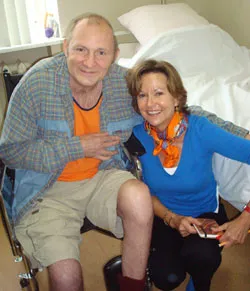In Moscow, progress is often followed by heartbreak. So it was on the day after our meeting with Russia’s top investigator, when we hit the wall of Russia’s dysfunctional criminal justice system.

On a drizzly Moscow afternoon, we gathered outside the hospital where Mikhail Beketov, former editor of the newspaper Khimkinskaya Pravda, is still recovering two years after a near-fatal beating. The thugs who attacked him surely did not expect him to survive. For one thing, they wore no masks when they attacked him in broad daylight. They smashed his skull, broke both of his legs, pulverized his hands and left him to die in the freezing cold. By some miracle, Beketov did survive. He is–or was–a powerfully built fighter, whose iron will seems intact as he fights now to recover. We talked to his doctor, who called his attackers “scum.”
At the time of the attack, Beketov was reporting on a proposed highway that would have destroyed a beloved forest in Khimki, a town outside Moscow. Remarkably, the reporter’s courage was rewarded with success. President Dmitri Medvedev suspended the road project because of the outcry that Beketov helped raise.
But the human cost of this is heartbreaking. Beketov lost the use of his voice and has had a leg and several fingers amputated as a result of the beating he suffered. Once burly, he is now a slight figure in a wheelchair.
Beketov’s case is really a metaphor for what is best and worst in today’s Russia. Best because public outcry stopped the highway construction. Worst because of the presence of thugs and killers, who will stop at nothing to silence brave truth-tellers and too often get away with their crimes.
We were deeply moved by the friends and neighbors, including Lyudmila Fedotova and her husband, Yuri, who have taken responsibility for Beketov’s care. Beketov himself was in excellent spirits. He smiled and stroked my hand. He cannot talk, but he understands everything. His friends said he still plays chess.
Fedotova and her colleagues have acquired a prosthetic leg, but it will take extensive rehabilitation for Beketov to be able to walk again. Regardless, he will require care for the rest of his life. I made a solemn promise to Beketov that CPJ will see to it that he has the care he needs.
This was CPJ’s third mission to Moscow in as many years and, in general, we are pleased with what we have achieved. This time, we had by far our best access ever; the entire criminal investigative committee and its head, Aleksandr Bastrykin, gave us pretty much all the time we wanted. Unlike in the past, they did not quarrel with us about the list of murdered of journalists whose cases we presented to them. It seemed as if they were eager to impress us with the fact that they were seriously investigating and open to new leads. Europe and Central Asia Program Coordinator
The Americans also rolled out the red carpet for us in big way. We were the guests of honor at a reception at the elegant Spaso House. Getting there was NOT half the fun. Moscow goes into what locals call “traffik collaps,” which means that the city turns into a parking lot at the first drop of rain. So our delegation, which included CPJ Chairman Paul Steiger, Executive Director Joel Simon and Senior Advisor Jean-Paul Marthoz, ditched our car and driver and got into the nearest subway. It turned out we needed three different trains to get to the reception, and we arrived soaking wet and exhausted. (I was still jet lagged since I’d flown in from New York the day before).
Ambassador John Beyrle gave a rousing speech about the role of free press and CPJ’s contribution. He tossed the mic to me and I did not pass up the opportunity to preach to a large gathering of journalists, diplomats and other colleagues.
But days after our meeting with Beketov, I cannot get the sound of his voice–a plaintive cry, unlike anything I’ve ever heard, and for now the only sound he can produce–out of my head.